#Semantic Externalism
Explore tagged Tumblr posts
Text
The Philosophy of Direct Reference
The philosophy of direct reference pertains to the theory of how language, particularly names and certain kinds of expressions, refer directly to objects in the world without the mediation of descriptive content or mental representations. This theory challenges earlier views in semantics and the philosophy of language, particularly those inspired by Frege and Russell, which proposed that names refer through a bundle of descriptions or senses.
Key Concepts:
Direct Reference:
Names as Direct Designators: In the theory of direct reference, proper names (like "Aristotle" or "Venus") are understood to directly refer to objects or individuals without the need for an intermediary description. The name "Aristotle" refers to the individual Aristotle, not to any particular set of properties or descriptions he possesses.
Rigid Designators: Philosopher Saul Kripke, in his influential work Naming and Necessity (1972), introduced the idea of rigid designators, which are terms that refer to the same object in all possible worlds where that object exists. For example, "Aristotle" refers to the same person in every possible world where he exists, regardless of whether he was a philosopher, a teacher, or had different life experiences.
The Rejection of Descriptive Theories:
Against Frege-Russell Views: Prior to direct reference theories, philosophers like Frege and Russell held that names or terms referred to objects through descriptions (e.g., "the student of Plato" refers to Aristotle). Direct reference theories reject this, arguing that names do not need a descriptive intermediary; they refer to objects directly.
Causal Theory of Reference: A key element of direct reference theory is the causal theory of reference, which holds that a name refers to an object because of a causal chain of communication that leads back to the object. When someone names a child "Aristotle" at birth, the name gets passed down through a causal chain from speaker to speaker, with the name continuing to refer to that individual.
Kripke’s Modal Argument:
Rigid Designators and Possible Worlds: Kripke's argument for direct reference focuses on the modal properties of names. He argues that a name refers to the same individual in all possible worlds where that individual exists, making it a rigid designator. Descriptive theories, by contrast, allow for terms to refer to different individuals depending on whether they fit the associated description in different possible worlds.
Necessity vs. Contingency: According to Kripke, certain facts about individuals are necessary (e.g., "Aristotle is Aristotle"), whereas descriptive theories would struggle with this distinction because a description might not necessarily pick out the same individual in all worlds. Thus, direct reference theory can explain why some statements are necessarily true (e.g., "Aristotle is Aristotle") while others are contingently true (e.g., "Aristotle was a philosopher").
Philosophical Implications:
Semantic Externalism: Direct reference theories contribute to the view of semantic externalism, which holds that the meaning of terms and reference are determined by external factors—such as the environment or the causal history of a term—rather than by internal mental states or descriptions known to the speaker.
Mental Content and Reference: Direct reference theory has implications for how we understand the relationship between thought and language. It suggests that when we use names, we don’t need to have a fully fleshed-out mental picture or description of the object; the name directly refers to the object simply by being part of the causal chain that leads back to the object.
Critiques and Alternatives:
Problems with Identity Statements: Critics of direct reference theory often point to the difficulty in explaining how identity statements like "Clark Kent is Superman" can be informative. If both names directly refer to the same individual, how can it be that someone learns something new upon hearing such a statement?
Descriptive Content in Communication: Some argue that in actual communication, speakers often do rely on descriptive content to ensure successful reference, suggesting that a purely direct theory might oversimplify how reference works in practice.
Applications in Philosophy of Language:
Indexicals and Demonstratives: Direct reference theory has also been extended to certain indexicals (e.g., "I", "here", "now") and demonstratives (e.g., "this", "that"). These terms are said to directly refer to objects or individuals based on the context of utterance, without the need for descriptive content.
The Role of Context: Direct reference places significant importance on the context of utterance and the causal history of names, arguing that reference is more about these external factors than about internal thoughts or descriptions.
The philosophy of direct reference argues that certain terms, particularly proper names and some indexicals, refer directly to objects without the mediation of descriptions. Developed in response to earlier descriptive theories of reference, direct reference theorists like Saul Kripke proposed that names are rigid designators, referring to the same object in all possible worlds. This view shifts the focus of meaning from mental representations and descriptions to external factors like causal chains and the context of use. While direct reference theories have been influential, they have also sparked debates about how reference, communication, and identity work in practice.
#philosophy#epistemology#knowledge#learning#education#chatgpt#ontology#metaphysics#Direct Reference Theory#Causal Theory of Reference#Rigid Designators#Saul Kripke#Modal Logic#Philosophy of Language#Semantic Externalism#Descriptive Theories
0 notes
Text
saw a post on here about making friends as an adult and i feel conflicted cuz like, overall i agree that all you have to do is get the courage to show up and get the ball rolling by talking to people/getting their numbers even if it feels cringe or 'wrong' to do so however i can't help but raise my eyebrow at the 'act like they're already your friend' part because some people lean way to into that to the point where they forget we're not actually friends yet which inevitably leads to them saying/doing something that's pretty out of line so like. yes put yourself out there, talk to them and get to know them but please remember that people need to actually like, warm up to each other which could take weeks of speaking to them regularly at minimum
#like. idk maybe i'm getting hung up on semantics#but if someone i barely know calls me their friend or bestie or w/e off the rip it just makes me want to keep a distance from them#bc i don't trust their intentions#i'm kind of an extreme case bc my brain is wired in a way that it takes me like. a year for me to comfortably call someone a friend#but even then i recognize i'm an extreme case and ive warmed up to people in less time than that so it just Depends on the person/situation#thinking about how someone early this year randomly dm'd me asking for help on something and when i said 'yeah sure'#they started going on about how i'm great friend for always helping people out amongst other random positive things which made me go ???#bc i never spoken to them or hung out with them so i had no idea what their basis was for saying that. so their words came off as fake#like they were trying to use flattery to get on my good side or something#externally i was cordial n saying 'thanks' but internally i was like: ?? who are you? why are you talking to me like that?#i've had diff ppl do this to me later on in the year and it never not creeps me out#similar vein ppl i don't know will do that thing where theyre rude in a 'friend way'but it doesn't creep me out so much as it pisses me off#and 9/10 these people always turn out to be not good people to be around so#yap fest over thanks for reading if you got this far.#ik i went on a tangent for a bit but reminder that i think the general advice of putting urself out there is good#i just think people lean too into the over-familiarity sometimes and need to remember to slow down a lil bit#bc before you're close friends with anyone you're still strangers/acquaintances with them first#strike.txt
2 notes
·
View notes
Text
How I improved my writing style... without actually writing.
Intro : It's just a clickbait title to talk about theory and side techniques - before actually practicing, of course.
LINGUISTIC ISN'T GRAMMAR - AND IT'S BETTER TO KNOW ABOUT BOTH. It's useful for writing impactful dialogue and giving your characters depth. Your characters' language should (ideally) take into account: their social position (rich or poor), the locality (local expressions?) and sometimes their age (different cultural references). And this is best transcribed with linguistic knowledge. In short: linguistics is descriptive, grammar is prescriptive.
The areas of linguistic analysis are syntax (rules governing the structure of sentences), semantics (meaning), morphology (structure of words), phonetics (speech sounds and equivalent gestures in sign languages), phonology (the abstract sound system of a particular language, and analogous systems of sign languages), and pragmatics (how the context of use contributes to meaning). (Linguistics, Wikipedia)
Literary theory isn't as boring as it sounds. Learn more about internal criteria of the text (figure of speech, style, aesthetic...) and external criteria of the text (the author's persona and responsability, the role of the reader and what is left to interpretation...). I refer you to the French Wikipedia page, which you can translate directly via your browser in case you need more information. (Make sure you translate the page not switch language, because the content isn't the same).
Listening to Youtube Video about the analysis of film sequences and/or scenario. Remember when I told you to read historical fiction to learn how to describe a castle properly ? Same vibe.
Novel adaptations of movies. = when the movie exists before the book, and not the other way around. e.g : The Shape of Water ; Pan's Labyrinth. In line with tip n°3, it allows us to see how emotions, scenes and descriptions have been translated into writing - and thus to better visualize concepts that may have been abstract.
Read books about authors' writing experiences. e.g : Stephen King, On Writing: A Memoir of the Craft. Everyone's different, but they can provide some insightful tips not only on the act of writing itself, but on the environment conducive to writing, planning… Comparing completely different authors' experience could also be fun (this video of King and Martin is actually one of my fav)
Ah and many thanks for your ❤ and reblogs on my latest post ! UwU
#creative writing#novel writing#writer blog#writing#writing process#writing help#writing resources#about books and writing#writing advice#writing tips#writeblr#writing a book#fiction writing#resources for writers#writing resource#writer of tumblr#writer problems#writiers on tumblr#writerscommunity#essay#how to write#writer things#writer tips#writersociety#writing blog#writing tips and tricks
2K notes
·
View notes
Text
Of My 50+ Favorite BLs these are the 10 I rewatch the most
So you could call these my favorite comfort foods. Everything on this list got a rating of 10/10 or 9/10 from me.
10 Most Comforting BLs
(for me, in order of most recently rewatched at the top)

Our Dating Sim
Korea 2023 Viki (watch the series not the movie)
This is a perfect short form KBL, an office set reunion romance featuring geeks that really suits 8 eps with no fluff and no chaff. Just comforting and yummy. I adored every aspect from the casting to the pristinely simple premise to the quietly smooth execution. Sure it’s low stakes, but that makes it high domesticity and extremely warm and gentle. This is a fuzzy blanket of a story - a cozy BL. It lives in my rewatch pile and you know what’s best about it? Every single episode is in that pile. There’s no skipping with this one, it might be good natured and calmly sweet but it’s tight and the pacing is excellent.
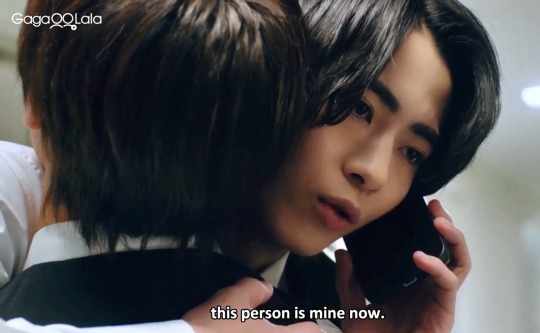
Cosmetic Playlover
Japan 2024 Gaga
The most recent release on this list, it came out this year and I've already rewatched it 5x. I love this little show. It's a classic office BL about the older workaholic who loves his job and the younger upstart who unexpectedly loves his boss. It’s a hyung romance where everybody is extremely earnest and sweet and pretty about everything. Except our seme, who is slightly unhinged and a little obsessed in all the ways one likes best from Japan (if one is me). Plus the kisses are good! Utterly charming unexpected gem of a show. What fun!

Jun and Jun
Korea 2023 Viki
A delightful office romance about an ex-idol who joins cubical life only to find his new boss is his first love. Other boys are sniffing around too. Operative word being "sniffing" as much of this romance involves smell. With a snappy (sometimes even raunchy) script, enjoyable sides, a pretty as peaches cast, and decent chemistry this show made up for in style what it lacked in substance. I like fluff. I loved this. I smiled every moment I was watching. My only caution is this is for fans of the BL genre only, I don’t think it’ll work for anyone else.

My Personal Weatherman
AKA Taikan Yoho
Japan 2023 Gaga
This style of live action yaoi really only works from Japan. Basically: boys who fell in love in college end up living together but are so repressed they don't realize they're in love. It's higher heat than we usually get from Japan's HEA stuff, and that aspect is also very well done, but it leaned into the "why don't they just talk for fuck's sake?" trope which is only exacerbated into undiluted frustration by the fact that they're already fucking. It's great, but watching requires more patience than usual, even for Japan. That said it's also bruisingly romantic. Emphasis on bruise.

Unintentional Love Story
Korea 2023 iQIYI
OMG the plot! Uke forced into a totally understandable betrayal, falling in love despite himself, put into a corner he can't get out of, the AGONY, the PAIN in those gorgeous eyes. Gah. Okay, so: A boy loses his job due to trumped-up corruption charges accidentally discovers his ex-boss's favorite artist, now a recluse. Evil manager offers him his job back, if he can convince the artist to rejoin society. Instead, they fall in love. I found the artist a bit stiff and reserved but Gongchan (maknae of B1A4) is a fucking GIFT - he carried this show (which I do not expect from the idol element). He was luminous with extraordinarily expressive eyes, just drown in the emoting abyss. The external conflict, social tension and pressure is complex and beautifully executed, plus Korea gave us legit side dishes (NOT a love triangle, hally-fucking-luya). All that said, when I rewatch this it's usually just the second half, but WHAT a ride.

Semantic Error
Korea 2022 Viki
Sexy older boy discovers pouty younger boy has outed him as a slacker, starts out bullying him, accidentally falls madly in love instead. Korea hits it entirely out of the Parks by doing a university BL with everything we expect from BL just done exactly right. Korea's signature quality executed perfectly with added bonus good story, great pacing, stunning visuals, and fantastic chemistry. You cannot ask for more from a BL, let alone a KBL. Another one where the rewatch is mostly just the second half.

Old Fashion Cupcake
Japan 2022
This show had me from the moment they broke the egg yolk with the chopsticks in the opening credits. It’s about a younger man with a long cherished crush on his boss (ten years older and going through a mid life crisis) who decides to save and seduce said boss with pancakes. It’s wholesome, comforting, sexy, and a very necessary narrative about still having hope, interests, and openness to affection at any age. It’s a stunningly filmed late-in-life comg of age/queerness story packaged in a subtle critique of expectations around masculinity, love, and loneliness… and it’s beautiful.
Yes yes. But the bit you know you want to rewatch is that long shot with the bite kiss. YOU KNOW you wanna.

Seven Days
Japan 2015
Ha! I faked you out 'cause this wasn't at the top but of course it's on the list! One of the best live action yaois ever made, with perfectly structured angst, fantastic characters and acting, and no problematic tropes (rare in Japanese BL). Older boy dares the hot af younger one to date him for a week. Turns out they both like it... A lot. The leads have excellent chemistry although it’s low heat there’s still some really cute mutual kisses.

Takara & Amagi
Japan 2022
I gnawed on my knuckles and squealed a lot with this show, but a rewatch is way less tense. Reserved cool kid must learn to communicate to keep the tiny disaster nugget he’s madly in love with. It is beyond charming: soft and gentle, packed with cuteness and high school angst, thirst, & yearning.

We Best Love
Taiwan 2021 WeTV
WBL successfully managed to pick up and combine the best features of Korean, Thai, and Japanese BL as it exists right now. Couple that to the insane chemistry from the leads, and we have one of the greatest BLs of all time, cooking to a recipe I doubt anyone else will ever be able to replicate since only Taiwan is this flexible. It's basically every classic BL trope bombarded at us in two parts, rapid fire, one after another. Rewatching this show reminds me of everything I love about this genre. It is the genre in pure concentrated form.
The End!
I think it's no accident that none of these are Thai, part of a rewatch for me is the brevity of the show, longer stuff does get rewatched, but not as frequently.
(source)
#10 Most Comforting BLs#most rewatchable bls#my most rewatched bls#best bls#favorite rewatches#korean bl#japanese bl#live action yaoi#taiwanese bl#Our Dating Sim#Cosmetic Playlover#Jun and Jun#My Personal Weatherman#Unintentional Love Story#Semantic Error#Old Fashion Cupcake#Seven Days the series#Takara and Amagi#We Best Love
686 notes
·
View notes
Text
I personally don't think it's enough to simply say, “as long as they're two consenting adults,” particularly when discussing issues that intersect with power, identity, and historical trauma. While I could go into the semantics of what constitutes an “adult,” the phrase itself is reductive. It assumes that consent exists in a vacuum, free of external influences. It ignores the social conditioning, internalized oppression, and systemic power dynamics. Sure we can acknowledge raceplay in the context of being performed by two consenting adults, however delving into it, we know it does not exist in a vacuum. Raceplay doesn't exist in a cultural void. It emerges from, and is steeped in, centuries of colonialism, slavery, systemic racism, and the fetishization of marginalized bodies. As people of color, our suffering has historically been commodified, exoticized, and eroticized. To pretend otherwise is, frankly, delusional.
Whether you acknowledge it or not, porn has a massive problem with racism, (especially anti blackness), this racism is exemplified in ebony or specific racial fetishes, bbc, being 'blacked', snow bunnies, asian inc3st fantasies or interracial scenes framed with white women as the default victim or prize. Add to that the disgusting frequency of race-coded rap3 fantasies where the “perpetrator” is Black and the “victim” is white or pale-skinned. These aren’t just harmless fantasies, they’re perpetuating harmful narratives that dehumanize blackness and reduce entire ethnicities to sexual caricatures. The media, including porn, plays a significant role in desensitizing audiences, including poc themselves, to racial prejudice and discrimination. When people consume these portrayals uncritically, they internalize the idea that such dynamics are not only acceptable but erotic. What exactly is justifiable about reenacting power structures rooted in slavery, colonial violence, or genocide for sexual gratification?
Is it excusable to engage in sexual naz1 roleplay simply because its between two consenting adults? No! So why defend something like this? The truth is, society has minimized the impact of racism and downplayed the lived experiences of people of color to such a degree that some believe raceplay is just a kinky or taboo fantasy to explore. It’s not. It’s a reflection of how deeply normalized racism has become
I myself am south asian, but i'd love to hear some opinions from other poc from differing backgrounds (or the same ofc) or links to resources and articles :) love my woc feminists<3
Also if you're white, i genuinely don't wanna hear you defending raceplay in any capacity, you will never understand the horrors of racism, this is a moment where you don't defend kink or fetish culture but rather just listen to the minorities this ultimately effects
if you can defend or dismiss these things, you're privileged
#tw rap3#blacklivesmatter#radical feminism#radical feminist safe#feminism#radical feminists do interact#intersectional feminism#people of color#radfemblr#radical feminists do touch#liberal feminism#radblr#black feminism#intersectionality#anti pornography#anti sex industry#racisim#racepl@y#kink critical
177 notes
·
View notes
Text
honestly i may not be completly binary but everytime i even hint at that people go ‘oh have you heard of [x label] or do you want to use [pronoun] or [term]’ and i promise you!! i do not! im perfectly comfy with my presentation and how i’m referred to, it’s just semantics at this point and i’ve kinda. done my time diving into it and honestly even if it’s not 100% accurate, telling people i’m a boy and being treated as one is far more comfortable than how people treat me when i identified as nonbinary (overcorrecting themselves constantly, assuming i preffered neutral terms and pronouns when that quite literally has never been the case.) regardless if i’m 100% male or not. does that make sense. to me, my actual internal sense of gender is way less important than making sure people externally gender me in a way im comfortable with..
350 notes
·
View notes
Text
i am not a brony or a furry
do not call me these things.
it may sound counterintuitive.. i love my little pony and i love anthropomorphic creatures. i'm friends with people who are the same. but i fully reject the labels.
i think i have always felt this way, but i had always succumbed to the external pressure that came from people who just cannot let go of things. there is a sub sect of people out there who will say shit like "oh well then ur just a deserter! ur not a real—" bla bla bla. like. real cultish shit. you're not in charge of my life, you don't decide who i am, and it affects you with a total net zero consequence of how i live my life. i'm not going to claim labels that i don't believe in just because some anonymous jackass has an unhealthy attachment to semantics.
so why am i not a brony or a furry?
well. i don't really relate to the communities at large. i don't really want to be a part of them. i have so much trauma and bad memories, that maintaining the labels inhibits my ability to grow and heal. i feel immensely uncomfortable with any large community of any kind, and i don't really desire to be a "part of a fandom" for anything i enjoy. i am my own person doing my own thing in my own space. the labels themselves specifically harm me, and represent a mentality and aura i want to shed and grow from.
does this change anything about my work or my personality?
not really. i simply reject the labels. i still love the things that i love, and engage with the things i engage with. i don't want to be a part of a fandom, i just want to be a fan. i don't want to associate with a community at large, rather be a transient presence in that space while mostly choosing my own actual space and defining what i actually am.
so what do you call me?
an artist. a person. a creature. a fan. a listener. someone who loves my little pony.
i'm not really interested in this being a discussion in which i aim to prove myself or justify my thoughts about these labels. this is a purely emotional and organic thing.
i will continue to do things exactly how i have always done them. i will always be involved in the business of telling stories about creatures and worlds. merely, i am not a brony or a furry while doing these things. i am my own person and am justified in defining myself <3
521 notes
·
View notes
Text
Keeping in mind that interpretations are subjective, but the reason I personally tend to veer from readings on Lucanis that box him into being reckless, impulsive, etc. is, at least in part, an issue of semantics, I think, in how those traits are positioned in discussion. Yes, these are facets of his personality, but more in that they're minor aspects that are attached to and/or must be triggered by something else as opposed to being the core traits they're often discussed as. And I say this because the only times we see him actually being reckless or impulsive or acting without a plan are under duress. That these facets come out during high emotional points is interesting in what it's saying about Lucanis and how whatever is occurring is effecting him, particularly wrt his emotional repression. It is more interesting to me to read these moments as being outside the norm for him for the significance that then places on them. Illario refers to him as always being in control of himself and a given situation. You can choose to interpret that how you want, but my reading is that’s how the people around him generally tend to view him, too. That his interior thoughts suggest it is a struggle for him to do so against these external expectations even before the Ossuary, when also considered alongside how much time he’s spent repressing his emotions, how he was essentially taught that to have strong emotions was dangerous, his resentment toward how much of his life is centered around decisions he didn't make for himself, and so forth all make these moments where that control breaks that much more significant.
Why is his anger at Forfex so significant? His personal principles were violated to a degree he couldn't ignore. Why is he crashing out at Weisshaupt? Because they're all unprepared to deal with reality of what they find there—he's an assassin, not a solider, and they don’t have a plan for how to deal with it. Why is his plan for confronting Illario after ensuring Caterina is safe reduced to 'knives'? Because now he only has the anger and hurt and betrayal at his cousin to focus on and can't compartmentalize that long enough to think about anything else—that fight is personal, it's ugly, and he still hasn't consciously thought about the repercussions of “taking everything” from Illario. He doesn’t know what’s going to happen when he’s faced with the moment of actually having to decide whether he’ll kill Illario or not. Do you see what I mean? They’re linked to moments where his behavior is saying something both about his emotional state and what’s happening narratively. It is also quite interesting, too, to look at how action-oriented he is in nearly every other aspect of his life (also why he approves when Rook makes decisions that prioritize action) except when it comes to his family (or dealing with his emotional problems at large) until he's forced to confront them. There is friction in all these things being at odds with each other at multiple different points between TWJ and VG that is compelling.
#it’s not limited to just these things either but these were the ones on my mind#necessary dislaimer that you read him how you want#these are *my* opinions etc etc etc#lucanis dellamorte
145 notes
·
View notes
Note
Forgive me if this is a silly question + no pressure to answer it ofc, but what would you 'replace' addiction with when discussing patterns of harmful and compulsive substance use? I agree with your views re: the disease model and its failure to engage with the material contexts in which these behaviours often arise, but I also find addiction a useful concept for talking about my own experiences with substance use (including severe physical dependency). It's a nebulous, imperfect term, but when someone calls themselves a [substance] addict you implicitly understand something of their relationship with that substance. For some the relationship is mutable, whereas for others it's a pattern that repeats throughout their lives; both can claim to have experienced addiction, as far as I'm concerned. But there are certain behaviours and attitudes that are very common amongst self-described addicts, and these commonalities form the basis of many peer support networks. Without the conceptual framework of addiction, would we not be even further isolated?
first of all i disagree that addiction is even a useful shorthand, and i think you actually contradict this notion yourself in this ask. if someone tells me they're an addict, do they mean they're a 12-stepper who views substances as external impositions onto the psyche curable by prayer to protestant god? do they mean they're physically dependent on a substance? that they have been in the past? that they subjectively feel out of control of their substance use? that it's escalating, or has been in the past? that it has cost them jobs or friendships? that it is subjectively enjoyable but exacts health effects they dislike? that they prioritise it over other elements of their life? that they use it as a form of escapism, as a form of self punishment, for some kind of spiritual enlightenment, as pain relief, as a distraction...?
if i care about the answers to these questions then the label addiction means nothing to me. i find out these answers by talking to people and the explanations are simply not summed up by that one word. i have met self-identified addicts with definitions of the term beyond my wildest conceptions & i'm sure i will continue to do so. "it's shorthand" is not factually workable if no one can even define what precisely is ostensibly being shorthanded. so on a basic level, no i actually do not think anything is being semantically sacrificed in challenging the idea of 'addiction' because it's a political dragnet, not a coherent psychological or experiential concept.
second, in a hypothetical world where the behaviour of using substances recreationally isn't pathologised, i don't really care that strongly what people do or don't call it. but i don't live in that world, i live in the one where the idea of 'addiction' is a clinical discourse born of a degeneracy theory discourse intended to produce economically useful citizens by pathologising inebriation. so i not only don't see the value in caping for the term, i actually think continuing to rely on these discourses is actively harmful. incidentally, and not to elevate my personal experience here, but some of the most heinous shit people have ever said to me wrt my own substance use has come from self-identified addicts too. because again, this term is not rooted in some kind of care model but in a political discourse intended to eliminate the behaviours it describes.
this to say: i'm not proposing an alternate name for addiction because i don't think it's actually a useful or liberating term, let alone a coherent description of any one psychological or personal experience. there are specific terms i sometimes use as far as they go: i might talk about physical dependency where applicable, or about feeling compelled to use substances (though i am becoming increasingly disillusioned with notions of 'compulsion' for basically the same reason, i use that term only as a purely subjective description, and frankly i may move off recourse to it at all).
but i don't see that the umbrella term 'addiction' is actually unified by anything except a political logic of attempted discipline & control. if i want to talk to people personally about our experiences using drugs then i already have quite a bit of vocabulary beyond the addiction term that i need & like to use for myself, & i solicit the same from the people i talk to wrt their own experiences & interpretive frameworks. i don't think using the addiction framework is good or even neutral in a politico-moral sense, and its conceptual heterogeneity means it's not even useful philosophically. what it does, and what it exists to do, is obscure the individual into a pathologising discourse intended to correct and punish a deviant behaviour.
106 notes
·
View notes
Text
Ok, ok. This has gotten to the point where it is simply intolerable, I cannot describe it as any other way than I am being raped from the inside, my own self is gone and in its absence other people are inside my body, inside my mind, violating me completely. I feel that I have no free will. There is never a break. It is accretionary; once I have been violated, my physical body it feels like but also my mind, it just stays there, the violating-instrument stays stuck in me throbbing. Please, please, I have not had a break in six months, it has been accreting for six months, I need this to stop. I do not know what is happening. There are two definite "sides", it's like my middle was removed and these strange sensations and false memories and so on run up my sides and then fuse in the middle, into something wrong and awful. But my actual grasp of the facts, both purely semantic knowledge and reality-checking, are completely intact. But everything else is messed up. All food tastes like piss, good feels like bad, I can't think clearly. I need this to stop, I cannot wait any longer, I need this to stop.
The sides correspond to my eyes, the sides thing has a reality to it in the sense that if I close one eye my perception of the world will be colored by the sensations from one side, if I close the other eye vice versa, and often it feels like I have different "intentions" in my two eyes. When this started I literally felt like I was going cross-eye all the time, there was this obvious visual twisting effect, but only when looking at things where the weird scrambling-and-fusing effect had messed up my perceptions internally.
Also there is a definitely feeling of being "down in myself", of being stuck "down" inside my mind. Like my brain's internal body-map, and especially my face, is not lined up with my actual body but is like "way down in my mind", and my body is sort of "empty", if that makes sense? And sometimes it tries to fill up my body but the parts go to the wrong places, my head goes to my hand or so on. I don't believe it's actually there, but it's SO VIVID, it FEELS like it's actually there. I'll feel my nose protruding out of my arm and shit. And I'm somehow twisted backwards, like, the outside world and my mind's eye have been "flipped", so that what's in my head feels more vividly real than what's actually real, and what's actually real feels like it's being inserted directly into my head.
A lot of overlap with psychosis, but all my doctors have said they don't think this is it. Mainly because my speech is unaffected, it's fully linear, and my reality-checking and grasp of the facts seems fine. To that I would add, uh...
Ok, most mental issues seem "fluid". In the sense that, like, say you have anxiety. Well, you can be anxious about one thing one day, then about another thing the next, it ebbs and flows and so on. I gather that psychosis is a least a little but like this, your voices and delusions ebb and flow. I cannot stress enough that what is going on with me is not like this. It is absolutely accretionary. Every little momentary sensation or mental image or whatever, external or internal, builds up and "sticks" within my mind, it doesn't pass, it doesn't go away, it just accretes as a huge indescribable blob. When the body map stuff gets really weird and I start to feel like my head is in a different place or my left and right sides are getting pulled, there is often visual flashing and other strange visual artifacts, and strange, horrible smells. The smells are the most vivid sensory part. And then these incomprehensible sensations just stick there and accrete, I feel mentally and physically twisted into a knot, twisted around myself and pulled through myself a thousand times and glued like that. This goes also for my memories and so on, even though I no what happened factually the actual memory is not of that, it's some horrible twisted thing. And anyway, when all this happens, it feels like a straight up computer glitch. Not a mental problem, a fucking computer glitch. And it feels like I am being progressively rewritten.
I have had an MRI, it was normal. At first the doctors thought this may have to do with epilepsy but I've had a few EEGs, they were normal, and I was on epilepsy meds for a few months and they didn't help. It's been almost 7 months now and I can't handle it any longer. Nothing has helped at all, it's all day, no breaks, even when I sleep I just have awful incomprehensible dreams all night. It is literally hell.
Please, if anyone has ANYTHING they can think of to try, or anything, let me know, I am really and truly desperate.
67 notes
·
View notes
Text
i've been working as a research assistant on a project looking at media depicting "warchitecture" in the yugoslav wars, chechnya and ukraine, and interpreting that as both historico-cultural semantics and as actual media. the project was inspired by and basically predicated on, the work of architectural philosopher/urban theorist andrew herscher, so i have a lot of the ideas from his work fresh in my mind. so with the ceasefire ending and israel's genocide continuing, i feel like it would be constructive to just share a bit from his book violence taking place: the architecture of the kosovo conflict.
herscher was working on his phd in the late-90s when the international criminal tribunal for the former yugoslavia (ICTY) asked him to join the prosecution and be an expert witness on the destruction of buildings during serbia's ethnic cleansing of kosovo 1998/99. and when working in the balkans collecting evidence and writing reports for the ICTY, he realised that relegating the destruction of architecture to an externality of violence was absent of the fact that the destruction and construction of architecture is a productive medium for expresing historico-cultural and political semantics -- invoking ideas of present and historical material conditions and realities, and enforcing them. in the case of kosovo, this was serbs ensuring the alterity of kosovar-albanians, projecting serbian orthodoxy over kosovar-albanian islam, destroying their communities to ensure they could not retain their autonomy, etc. one of the most common instances hersher encountered were the minarets of mosques being toppled, but the building left otherwise mostly intact. this is violence as performance, and as a means of engaging in a cultural discourse to marginalize and eliminate a community. it's a kind of violence which architecture reciprocates and reproduces meaning in.
attached a bunch of excerpts below. consider gaza and the experience of palestinians, and remember that the yugoslav wars ended with 161 political and military leaders being brought before a judge at the hague.

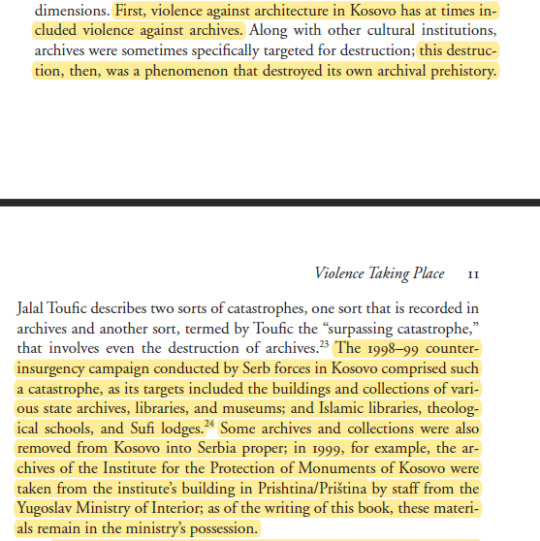

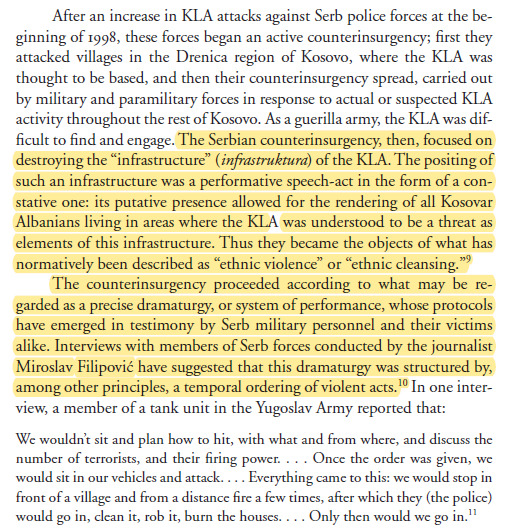
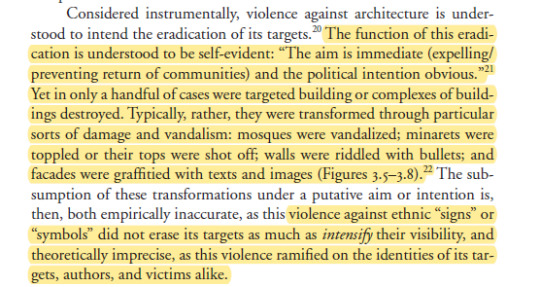
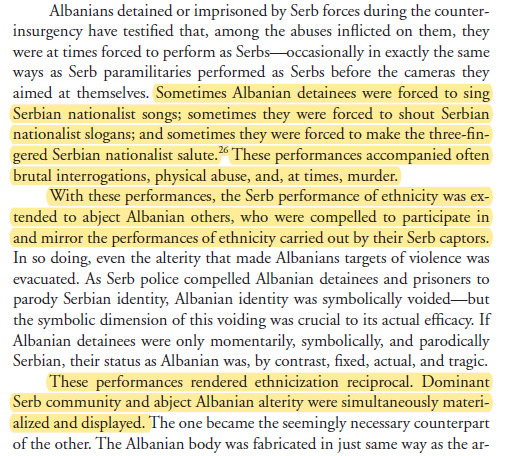
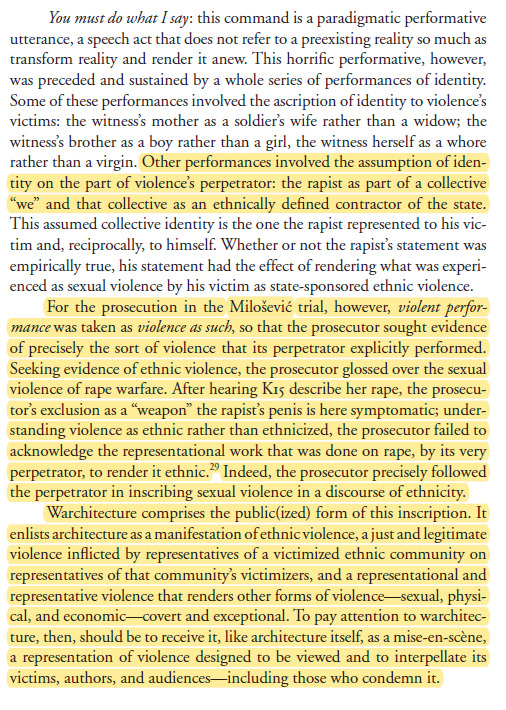
307 notes
·
View notes
Text


Psychological transition ; Linguistic transition
Psychological transition: when your mind adapts to a new gender that was unusual of you before.
This may include finding out that you experience your natally assigned gender or sex, after questioning or feeling a void about it, not just transitioning to the other side or beyond a specific AGAB.
Linguistic transition: going through a different form of experiencing gender language, typically in grammar, syntax, lexical metaphor, or semantics
The most known forms of linguistic transition are name change and pronoun change, but can be beyond those things. Overall this may also include the journey of finding out you possess/own/have finally the imposed pronoun or initially registred name after all.
The psychological type is often associated with social transition, in which your social circle starts to refer to you as a certain gender and that helps you navigate with such gender, exploring a gender life. However, that is psychosocial transition, because you can transition psychologically (mentally, thymically/thymally, phrenically, psychically/psychally, thymopsychically, mindfully/phrenetically, or spiritually/religiously, in uncommon definitions) without externalizing (verbalizing) or telling anyone else (extrapersonally/exopersonally/ectopersonally), which typically means you're closeted about it, but you don't necessarily need to out yourself to someone just because you found out something different. Also you can alter everything outside and only name it rightly in your psyche/mind/thymus after it. imagine crossdreaming.
The linguistic type is not something exclusive to transnominal/crossnominal or people with name dysphoria (sofrimento/tristesse or disconnect/incongruence), this may or may not be a form of name nonconformity. Another form of linguistic transition is transitioning through grammatical objects, animacy/inanimacy, grammatical persons, or isochronally (tonally/accentually/syllabically/in a mora way), for example, depending on the language there are multiple ways to do this. This could extend to any label, if you think about it lexically/lingually.
More importantly (note): these are describing acts, not definers/identifiers.
#linguistic transition#name change#psychological transition#transitioning#gender#pronoun ideas#pride flags#mod a-p#mogai pride flags#beyond liomoqai#qai coining#liomogai safe#liom term#mind#pronouns#names#new#psyche
24 notes
·
View notes
Text
Disneyland is in Every Thought
With this post I want to outline a series of articles divided into 3 parts. In the content of them I want to describe some historical, cultural and social phenomena that, in my opinion, have the most significant impact on the formation of our contemporary. I don’t deny that this selection is relative and reflects my subjective opinion, as well as that I limit myself to the Western European model to consider the historical development.
What happened? According to Walter Benjamin.
The first half of the 20th century. Europe had not yet recovered from the shock of the First World War, although Germany, under the influence of political disorder, had already embarked on the fascist path.
Walter Benjamin, who had emigrated to France because of the persecution of Jews in Germany, undertook to write one of the most influential essays in the history of art and media - "The Work of Art in the Age of Mechanical Reproduction". With an avant-garde style influenced by the crisp air of Parian freedom, Benjamin was able to capture the foreshadowing of a technological revolution that transformed social attitudes and cultural space forever.

Through the transformation of industrial technology, the notion of the “work of art” changed not only its external form but also its semantic context. From the unique print on glass (Daguerreotype) to photographic film, from the unique theatrical performance to the mechanical reproduction of film, cinema and photography have replaced the classical notion of the “original” with the modern notion of the “copy”.
Benjamin observes:
“With the invention of cinema and photography, the meaning we put into the notion of uniqueness has become irrelevant. It is meaningless to demand originality from something that itself can exist only as a copy."
Meanwhile, under the pressure of the spirit of the time (Zeitgeist) the concept of “Genius” as of the mediator between spiritual and profound, and the idea of “Intrinsic value of art“ were effectively sent into oblivion without a farewell parade, namely subjected to secularization.
Not without a strained enthusiasm, Walter writes:
“For the first time in world history, mechanical reproduction emancipates the work of art from its parasitical dependence on ritual’.
In the process of this turn, art, under the pressure of social transformation, leaves the realm of purely aesthetic relations and becomes a mode of transformation of the perception within the political context of the social dynamic.
This change in the human-artwork relationship was imbued with hopes for a better future and a change in the course of human history. Hopes that unfortunately were never fulfilled. Even Waller Benjamin by the irony of the hard fate, fell victim to the Nazi, which, through the glitter of new forms of art reproduction, was covering up a political crime against humanity, i.e. used the very “emancipated art" for its own political purpose - to propaganda of the regime of national-socialism.
Why did it happen? A first critical assessment from Adorno and Horkheimer
Only 12 years after the publication of “The Work of Art in the Age of Mechanical Reproduction”, and 7 years after tragic death of Benjamin, the highly respected founders of the “Frankfurt School“ of critical philosophy - Theodor Adorno and Max Horkheimer in their work ‘The Culture Industry: Enlightenment as Mass Deception” described the changes of the culture industry based on Hegel's philosophical concept of dialectical unfolding of the history.

In this book Theodor Adorno and Max Horkheimer compare the new time of mass reproduction with the stage of Enlightenment. Period of the Enlightenment also became a force that changed social relations in the 18-19 centuries. It was centered around the transformation of public education and around the figure of Imanuel Kant, with his project, outlined in the Critique of Pure Reason, namely the victory of the rational over the religious.
Enlightenment, understood in the widest sense as the advance of thought, has always aimed at liberating human beings from fear and installing them as masters”.
Under the influence of Enlightenment, human beings for the first time went beyond the mode of identity given to he/she within a social role and developed new self perception. Self-evident dedication to family and conformity to other individuals fell into decline, making way for a sensible individualism that contributed to the rise of culture. This shift often calls - change from the mode of sincerity to the mode of authenticity.
At the turn of the 19th and 20th centuries, we were witnessing the new twist in identity mode - decline of authenticity. Culture has ceased to be a force for empowering individuality and in fact became an industry that fosters the creation of fake identity based on mass culture. The artist has been downgraded to employee of the business industry, and intellectual property has been reduced to a product of general consumption.
"Today the order of life allows no room for the ego to draw spiritual or intellectual conclusions. The thought which leads to knowledge is neutralized and used as a mere qualification on specific labor markets and to heighten to commodity value of the personality.”.
Thus Theodor Adorno and Max Horkheimer, in spite of their aggressive but necessary criticism, legitimize the society of mass consumption as the process of historical necessity that took its place in our recent past.
The view on culture in the context of emancipation no longer had its sublime naivety of Benjamin hope, but is characterized by a critical view towards validity.
“What we had set out to do was nothing less than to explain why humanity, instead of entering a truly human state, is sinking into a new kind of barbarism”. With these words Theodor Adorno and Max Horkheimer characterized their book which became a classic example in exposing the sweet glow of the mass consumer society.
The result of fusion and Marcuse's one-dimensional man.
In 1964, during the golden years of capitalism, Herbert Marcuse published his highly controversial and scandalous book, entitled “One-Dimensional Man”. There, through an insightful form of critical reflection, he delineates from the individual to the collective level of the spiritual, intellectual and cultural phenomena that till today defines our social and political relations.
These days, 17 years after publication of the “The Culture Industry: Enlightenment as Mass Deception”, capitalism has thoroughly conquered its place in the Western society and within the pressure on post war Europe and Third World countries, began its mission to make the whole world a better (more profitable) place.

“The so-called consumer society and the politics of corporate capitalism have created a second nature of man which ties him libidinally and aggressively to the commodity form” - says Marcuse.
In the content of the book "One Dimensional Man", Marcuse wants to make us realize that the media and entertainment industry has transformed itself into an absolute form of power over society. This became possible through control over human desires. By creating demand for goods that are not necessary but desirable, capitalism, through the media industry and the subtle psychological manipulations, mastered by Sigmund Freud's nephew Edward Bernays in the 1930s, has extended its influence over the public opinion.
The publicly endorsed consumption of mass-produced goods made it possible to replace the pursuit of long-term and tedious goals (e.g., changing the social system through the interaction and cooperation of individuals) with short-term gratification (shopping, smoking, movies) as a form of social control. This new way of life of modern man was supported by an uncriticizable belief in progress as a necessity to which the human world is subjected. Speculating on the philosophical doctrine of Positivism, which asserts that the source of true knowledge is available only through empirical research, the world of technological progress has no longer remained an object of criticism and reflection, but has turned into a self-fulfilling given.
Marcuse asserts:
“Rationality and productivity guide our life and death. We know that destruction is the price of progress just as death is the price of life, that the prerequisites for satisfaction and joy are renunciation and hard work, that business must go on at all costs, and that alternatives are utopian."
In the conditions of progress as a necessity, Marcuse notes that the tendency to tolerance and the maintenance of diversity in society is implementing only if the generally accepted norms, as the culture of mass consumption, are not criticized, and the realm of socially accepted consumer activity recognized as the best of all possibilities for the existence of society. This ensures that thinking remains flat, one-dimensional and self-preserving. If the new emerging thought does not obey the rule of correlation with the system - it automatically forfeits its privilege of being tolerated and becomes the result of “Savagery” and therefore not subject to review or discussion. "It is obvious that in the realm of Happy Consciousness no place for feelings of guilt, the concerns of conscience have taken over the calculation. When the fate of the whole is at stake, no act is considered a crime except the rejection of the whole or the refusal to defend it" - writes Marcuse.
However, Marcuse does not leave us without hope. In spite of the one-dimensionality of modern man, he asserts that there is an accessible act of breath of the fresh air that takes place in pure creativity. Which I find still relevant today. Even though it's obvious that with the development of new technologies and social media, this act of pure creativity is becoming increasingly difficult to accomplish.
And that's what Marcuse also predicted:
“The absorbent power of society depletes the artistic dimension by assimilating its antagonistic contents.”
Summarize
During the time spent reading this compilation we drew a historical parallel and learned that the forms of technical enrichment have changed not only the forms of the production of goods, but also the meaning of cultural concepts, of the work of art, the forms of human self-perception and the way of thinking/living of the individual, which to this day are under compulsion to either conform to technical progress or be excluded from social dynamics.
#philosophy tumblr#philosophy#anthropology#culture#sociology#mass society#herbert marcuse#walter benjamin#theodor adorno#max horkheimer#history#art history#erudition#enlightenment#individualism#contemporary art#berlin#art study
21 notes
·
View notes
Note
Hi P’ABL, building off an earlier ask you answered, what are your top recommendations if I want to watch a BL where the main focus is the romance between two characters? Something along the lines of Semantic Error for example? Or even Old Fashioned cupcake?
Hum, you mean where there is little to no outside plots, external pressure, or secondary characters? Most KBLs are pretty closed systems but they of have external pressures. Lemme think... there are shorts of course. Okay I did a ratings sort and then just read through my favorites with this in mind... this is pretty darn subjective tho.
BLs that are just simple sweet romances
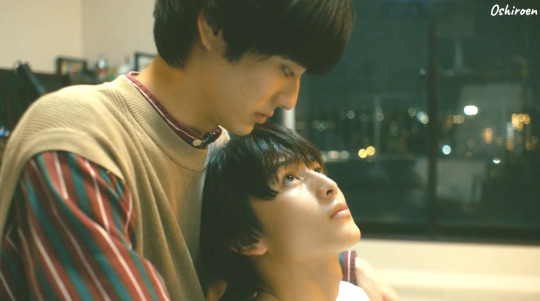
High School Setting
I Cannot Reach You AKA Kimi ni wa Todokanai (Japan 2023) - a very simple friends to lovers romance.
HIStory 2: Crossing the Line (Taiwan 2018) - classic sports romance
My School President (Thailand 2023) - the high school version of soft boys being soft, there's a side "plot" and a band but who cares?
About Youth (Taiwan 2022)

University Setting
Semantic Error (Korea 2022) - asker chose this as their primary example.
A Breeze of Love (Korea 2023) - reunion romance
A First Love Story (Korea 2021) - 2 part short that is exactly what you want.
Oxygen the series (Thailand 2020) - the university version of soft boys being soft, this one is a hyung with the young rich boy chasing the older orphan
We Best Love (Taiwan 20210 - part one is enemies to lovers, part 2 is office reunion enemies to lovers 2nd chance.
2gether (Thailand 2020) - oh the pining ridiculousness
Star in My Mind Star and Sky (Thailand 2022)
Hidden Agenda (Thailand 2023) - that isn't hidden at all
Love By Chance (Thailand 2018) - watch for AePete and TinCan but don't bother with the other threads
Why R U? (Thai 2020) - I mean it's madness but there is no other plot but the romances
Why R U? (Korean adaptation of Thai original) (Korea 2023)
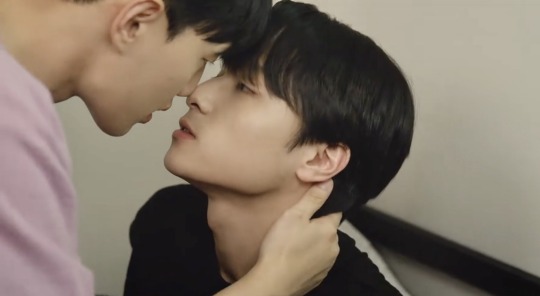
2 Moons 2 is kinda the same thing, but I don't rate it as high as the Why R U?s. There are many who would call me crazy for this.
I thought about including the Love Class series but both of them have stalking sub plots. And I'm inferring you don't want any darkness or stress at all.
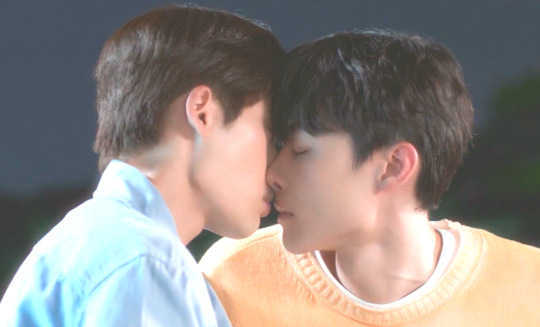
Office Romances
Old Fashion Cupcake (Japan 2022) - asker chose this as a second example, although I would call it a bit more complex given the themes of self discovery and worth.
Our Dating Sim (Korea 2023) - basically a reunion romance (second chance) but there is a bit of work stuff.
Be Loved In House: I Do (Taiwan 2021) - office romance, it's Taiwan so like We Best Love it'll be a little chaotic but I think it's what you're looking for.
Love is Science? BL Cut (Taiwan 2021) - the gays are the side couple there is a noona romance lead and a mature romance side, everything soft romance all day long.
Step By Step (Thailand 2023) - pretty classic office romance, Korea's version is called The New Employee and is also good but there is a lot more about the actual job as part of the plot.
Love Mate (Korea 2023) - aggressive pursuit from the new intern but it's a Kdrama so its ultimately soft...
Roommates of Poongduck 304 (Korea 2022) - cohabitation and office enemies to lovers

Foodie Romances
Bon Appetit (Korea 2023) - reunion romance
The Tasty Florida (Korea 2021) - love at first sight
What Zabb Man! (Thailand 2022) - he knows him by the taste of that one dish!
You Are Ma Boy (Vietnam 2021) - had to throw in something from Vietnam
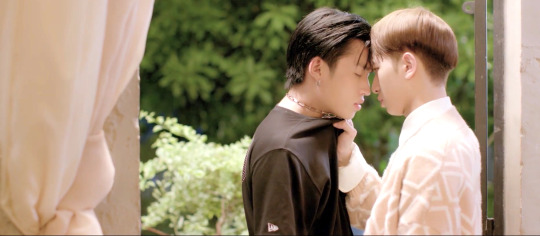
Countryside Setting
Love Tractor (Korea 2023) - city boy meets country boy, they fall in love, opposites attract
A Tale of Thousand Stars (Thailand 2021) - okay this does have lots of extra characters and some complexity because it's GMMTV and Thailand but it is the most classic "romance" that Thailand has ever done gay. Kissing on cliffs at sunset and parting at airports and everything.
Some More (Korea 2018) - another great short that meets your criteria
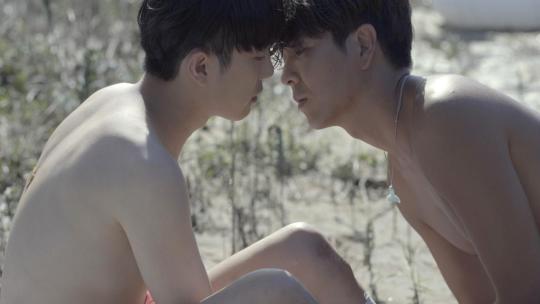
Okay I think that's it, if you want to give more restrictions I could tailor the list down more.
#Semantic Error#sweet pure romance BL#Old Fashion cupcake#BL suggestions#BL recommendations#BL to your taste#Thai BL#Korean BL#Japanese BL#Taiwanese BL#Vietnamese BL#I Cannot Reach You#Kimi ni wa Todokanai#Our Dating Sim
138 notes
·
View notes
Note
Re: Vidit Gujrathi doctor post
1st July is celebrated as doctor's day specifically to honor medical doctors. PhD holders in any academic field are also given title of 'doctor', this day isn't about them.
Physiotherapy is focused on rehabilitation, a physiotherapist isn't authorized to diagnose illness or prescribe medicine to a patient. Cosmetologist too performs aesthetic and external treatments, unlike dermatologists they cannot diagnose skin, hair and nail diseases and prescribe medication. They are healthcare professionals, but they aren't considered medical doctors worldwide.
Homeopathy is based on placebo effect, with no scientific evidence. It's a scam.
Ayurveda has certain legitimacy but dearth of scientific research about Ayurvedic techniques is why it isn't at par with modern medicine. BAMS degree holders are titled 'Vaidya' rather than doctor. In India, you would find BAMS doctors putting their degree qualification in such a small font on prescription that it's hardly noticeable. They set up clinics mostly around underdeveloped areas and treat people who aren't knowledgeable enough to distinguish between MD doctor and BAMS doctor. They also prescribe allopathic medicine, which they legally aren't authorized to do either.
I don't think liverdoc said anything wrong in the first tweet. He didn't attack Vidit's family. It's Vidit who got defensive and attacked liverdoc in retaliation, then the idiotic trolls came in. To become a medical doctor in this country, we've to crack and score well in a highly competitive exam like NEET, do MBBS, do MD specialization and maybe DM after that. The time, effort and perseverance to become a modern medical doctor cannot be compared with BAMS doctor who pose to be on same level. It was wrong of Vidit to have not acknowledged that in first place.
A lot of doctors, who may not even agree with Liver Doctor Cyriac Abby Philips, have expressed their displeasure over the fact that BAMS "doctors" call themselves doctors, because at the end of the day, Ayurveda, unani, and homeopathy are pseudosciences. Many of Philips' concerns are valid, as "Ayurvedic supplements" aren't subjected to the rigorous testing that modern medicine is, therefore, when people take Ayurvedic supplements, they might unknowingly destroy their own livers. In that case, those people always go to fix the problem at the real doctors' office. My personal opinion, too, is that alternative medicine does not compare with modern medicine. The practitioner of modern medicine, who had to pass difficult exams, is not on the same league as alternative medicine practitioner. In the face of this problem, where alternative medicine, which still isn't required the rigorous testing, is put on the same level as modern medicine, real medical doctors concerns are very much valid.
I also understand that after a decade of difficult studies, it feels like an insult that a homeopathy practitioner gets called a doctor too. It feels like an insult to your work and your craft. I also never ever call homeopathy or other traditional or alternative medicine practitioners as doctors. Philips was not wrong when he posted that none of Vidit's family members are real doctors, although they can use the title "Dr." by the decision of Indian Ethics Council. The semantic shift that happened with the word "doctor", and what today is understood with the word "doctor", doesn't matter. An MBBS (or MD in USA) is called a doctor even though they did not go through the arduous process of doing a research and earning that PhD. For medical doctors like my dad, who has a PhD, that has actually always felt like an insult that "regular doctors" get to call themselves doctors too although they don't even have PhD.
So, that's why people make the distinction between MBBS doctor and BAMS doctor, right? The national doctors' day is indeed meant to celebrate "medical doctors", right? Is this day a sacrosanct day though? Does it make any difference if this day existed or not? The fact that adult people, medical doctors too, got their panties on a twist just because a chess player dared to wish his family on doctors day, a total meme day, going as far as go after his grandmaster title. I'm sorry but thousands of people pass their exams and become a MBBS but becoming a grandmaster at chess is much harder, statistically speaking. Having said all the aforementioned, should MBBS or MD folks get a sense of proportion? The truth is that quite a few Indian MBBS doctors are needlessly arrogant. Not all, but quite a few, believe that they're above others just because their job is demanding and the exams they have to pass are difficult. So, very often you see them pass classist comments on nurses, or professionals of some other fields. It doesn't help that Indian parents blow the egos of their doctor children, and drill it into their psyche that they're the cream of the marriage markets because they're medical doctors.
This is what it boils down to. Philips' concerns started out as valid, at the beginning. But his arrogance and the way he conducts himself have been disgraceful to look at. It has nothing to do with his identity or his qualifications, but his online behaviour. He always has the choice to just not respond and keep it civil, but the kind of behaviour he displays can hardly be called normal. About Philips, he calls out Ayurveda and its practitioners. That's alright and all. But he does work in a hospital which offers "pastoral care" and Jesus healing. We haven't seen him say a word against this. It's no wonder that people are suspicious of Liver Doctor Cyriac Abby Philips' motives.



#anon#asks#anon ask#desiblr#hindublr#india#liver doctor#medicine#alternative medicine#modern medicine#ayurveda#discourse
12 notes
·
View notes
Text
Demigods in The Silt Verses
~~ spoilers for the entire show~~
Relistening to TSV and I won't lie, alot is blotted from my memory due to the trauma this show has given me (in the good way), however finishing season 1 I feel like we only see 2 proper demigods?
The most obvious is Val, her and TheLast Word have intertwined so much that she is it and it is she. From what I remember The Last Word is a new propaganda God, so it would make sense she's it's only disciple and therefore able to completely co-exist within her. Not like a larger faith where the constant pulling from other worshipers means it'll hurridly create saints before moving to the next call.
Val is called a battle saint but the level of autonomy, internal thought, and "humanity" she's retained makes her seem like a true demi(in the purist sense)-God.
The second is almost the opposite, but also not.
Paige.
In some regards they're similar, both Paige and Val want to change the world they live in, and both The Last Word and The Wound Tree want to help facilitate that. What's different is that Paige won't allow it. In some ways Paige is a black box, Val has proven the coexistence she has, by preforming miracles without losing (much) control. Paige on the other hand never really utilises The Wound Tree's power directly, acting as a messiah and letting others call upon its power. This would put her in the same camp as Faulkner, where they're more "divine emissaries" rather than demigods.
However the difference I think is their internal worlds. For Paige, The Wound Tree is HER. It's her baby, a part of herself, her deepest wants, it hunts for HER and wants to give her everything she wants if only she would let it. The Trawlerman is an external force for Faulker, an important one, but he's his conduit, not a host. This might seem like semantics but in Paige we see a coexistence, not a healthy or balanced one, but The Wound Tree is in her unlike any other God we've seen.
Also like The Last Word, I think the small size of Paige's cult was why she was able be the incarnate of The Wound Tree. I think among other reasons she decided to abandon the cult was that, as it grew, she could feel her demigod status changing, and she'd either become a saint or a messiah.
In this way I'd say that Demigods in the TSV universe are humans fused with all or a large portion of a divinity. Not saints as they retain their higher cognitive thinking and relative autonomy, and not messiahs, as the divine is an internal part of them, not an external source to which they are a special person too. A coexistence is needed but as with both examples above, it'll always be on a knifes edge and will eventually crumble. Lastly an alignment of goals, down to the minutiae, is needed and works best if the deity was made for the demigod or vice versa.
Other possible demigods are -
Side Wright - who I was originally gonna have as one of my 2 but thinking on it, paige is much closer to the balance than he is. However he does seem different from other saints we've seen, like Babble, as he seems bitter (haha) wnough to recognise he was sacrificed for no great reason.
Mercer and Gage - I think they where gunning for demigod status but would've likely been sainted. However Mercer at least was perfectly aligned with The Beast That Stalks Through The Long Grass, it's just that for them to remain perfectly aligned she would've had become more animalistic and eventually would just be a saint.
Carpenter - personal crackpot theory, I think by the beginning of the show Carpenter isn't tied to The Trawlerman at all. Her use of language, her philosophy, and the results she gets when she invokes it. I think Carpenter made a new river god "My River". And I think that is who she's the demigod of ... possibly. "My River" as a separate deity to The Trawlerman is a whole other post that's too long for here.
Anyways I know the TSV is antithetical to categorising the divine and their effects, and the whole show is about trying to read human concepts into what are essentially reality parasites, but this was kicking around my brain for too long and the voices must be expunged. I hope you enjoyed.
#fair warning im up to chapter 15 of my rewatch and i haven't relistened since the S4 finale aired#the S4 finale had me SOBBING at my minimum wage job#with TMA i restarted ep 1 afew days after ep 200#i needed MONTHS for TSV#so if anything is inaccurate or was already covered in a q&a or the actual text thats why#the silt verses#the silt verses paige#the silt verses val#tsv
23 notes
·
View notes